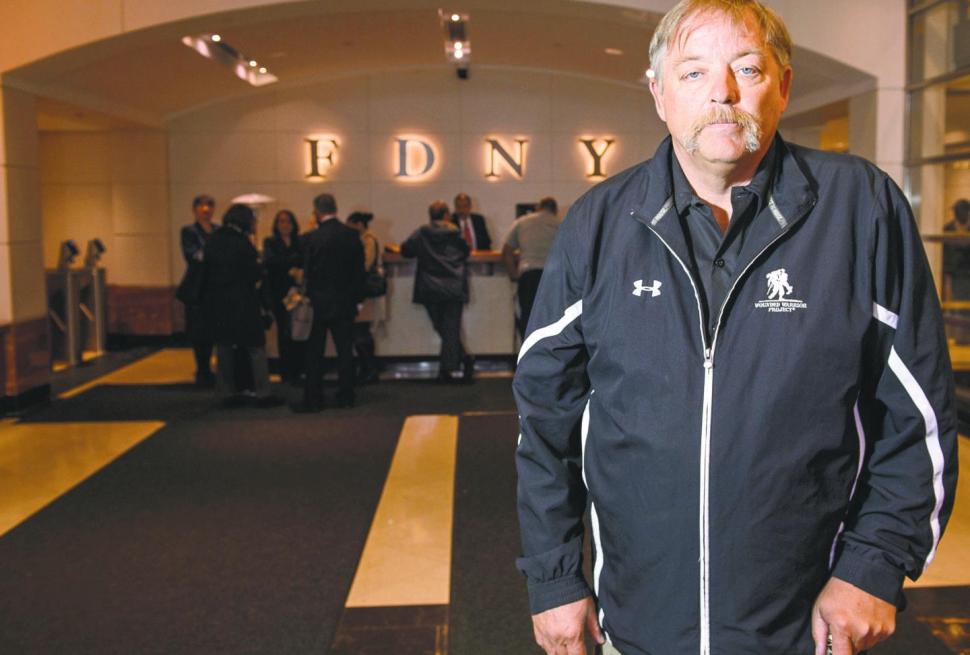Barry Paddock NY Daily News
As FDNY first responders come down with 9/11-related illnesses at an ever-quickening rate, one survivor battling stage-four cancer still calls it the best job in the world. And he’s thrilled his son is following in his footsteps.
“It was exciting from day one up to the last day I worked, every single minute,” retired firefighter Ray Pfeifer told the Daily News. “I was proud every day to put that uniform on.”
Pfeifer, 57, toiled for eight months at Ground Zero after 9/11.

Ray Pfiefer was diagnosed with renal cancer and went into emergency surgery to replace his hip and part of his femur. Two days later he had his kidney removed. He went on to have six more major surgeries. Photo Jeff Bachner New York Daily News
Six years later, he was rushed to the hospital with a sharp pain in his waist.
Doctors determined a baseball-sized tumor in his leg had broken his hip. He was [also] diagnosed with renal cancer and went into emergency surgery to replace his hip and part of his femur. Two days later he had his kidney removed. He went on to have six more major surgeries.
He was transferred to light duty by the FDNY, working as a chief’s aide at headquarters until a chemotherapy-related heart attack finally forced him to retire just last September.
“I had a great run,” he said. “I had 27 years and 220 days. I worked with a lot of brave men. I wanted to be a lifer. I wanted to make it to 30 years, but it was cut short.”
Now the cancer is attacking his ribs. He met with doctors at Sloan Kettering Cancer Center earlier this month to strategize how to fight it.
“I see other firemen, paramedics, EMTs and cops there,” he said. “It’s so sad to see so many people being treated for all kinds of crazy cancers. You name it, they got it.”
At least 106 FDNY members have died of 9/11-related illnesses, according to an FDNY spokesman, and about 900 are sick.
But Pfeifer had something to lift his spirits last week — on Monday his son was sworn in as an FDNY EMT.
Terence Pfeifer was only 10 when the towers fell.
“For a whole year I wasn’t really around,” Ray Pfeifer said. “I was either going to funerals or downtown digging.”
That didn’t deter his son’s dream of following in his dad’s footsteps.
“I just always saw how the brotherhood was,” said Terence Pfeifer, 23. “I always wanted to be a part of it since I was little and saw him doing it.”
For Ray Pfeifer, that brotherhood continues even now that the job has ended.
“I stop by the firehouse when I go to Sloan,” he said. “That’s my second family. It’s tough to turn it off. I don’t think it’s like a regular job where you retire and forget it and say, ‘I’m going to Florida.’ It’s in your blood.”
Experts say illnesses among 9/11 first responders are far from peaking.
“We expect it to rise for many years,” said Dr. Jacqueline Moline, who runs North Shore-LIJ’s Queens World Trade Center Health Program. “We know it takes years for cancers to develop until they manifest themselves clinically.”
Among the most common illnesses Moline sees now are prostate and thyroid cancer and multiple myeloma. She fears a future wave of asbestos-related cancers, which take at least a decade after exposure to show up. Every FDNY member who survived 9/11 could be at risk.
“This was the entire force — virtually everyone had World Trade Center exposure,” she said.
But for Ray Pfeifer, there are no regrets.
“The job has been very good to me,” he said. “It was a great way of living.”

